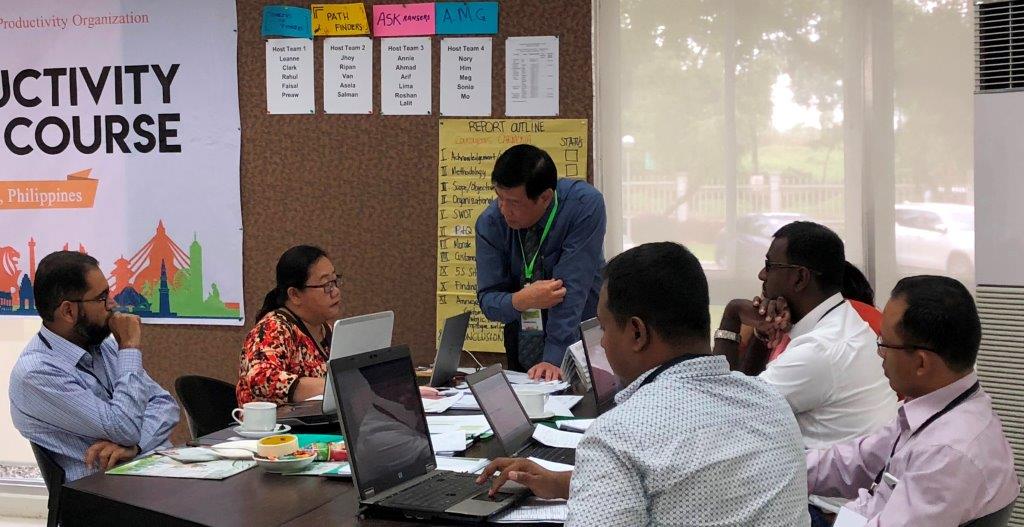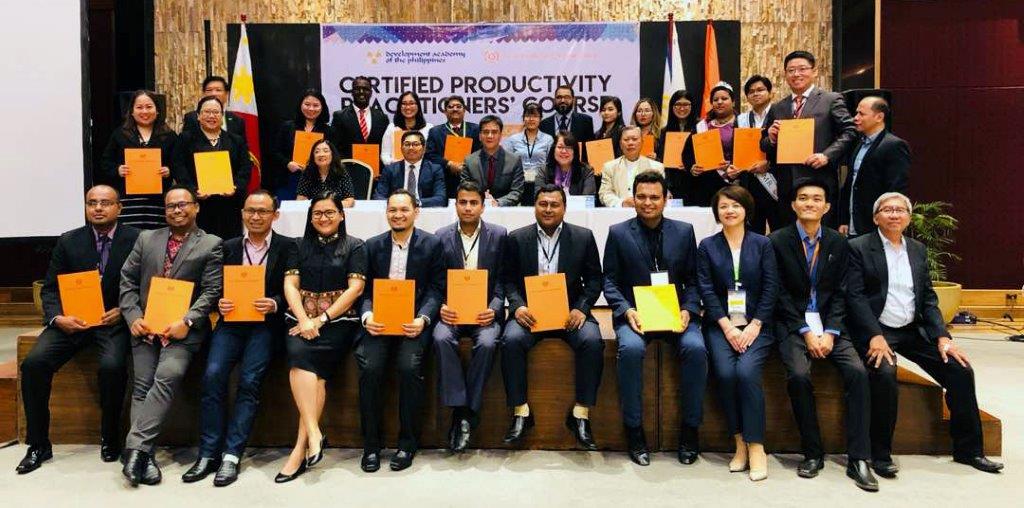
Select Page
The Asian Productivity Organization (APO) along with the Development Academy of the Philippines (DAP) conducted a Certified Productivity Practitioners’ Course from 20 to 31 August 2018 in Tagaytay City, the Philippines. The course was designed to enhance the competencies of productivity practitioners in NPOs. The course also focused on preparing participants for certification and becoming APO-Certified Productivity Practitioners.

The certification program helps the APO develop a pool of productivity practitioners and quality experts with knowledge of fundamental productivity concepts, principles, and tools. These certified practitioners are expected to provide consultancy and help implement programs that can improve productivity in member countries. They are also trained to adopt integrated productivity frameworks to diagnose productivity problems and develop and implement solutions. The APO-Certified Productivity Practitioners also provide training, consulting, and promotional services to NPO clients.
Qualified participants for this course are selected from among those who previously enrolled in and passed the self-learning e-course on Productivity Tools and Techniques (Basic and Advanced) or APO projects under the Development of NPOs Program in the preceding three years. The 12-day course in Tagaytay City was attended by 21 participants from 13 APO member countries. It was conducted by APO-assigned resource persons from Japan, Malaysia, and Singapore, along with local resource persons from the Philippines. To qualify as APO-Certified Productivity Practitioners, the participants must submit their project reports six months after completion of the course.
During the program, participants visited four organizations for practical study. These included: the Provincial Government of Cavite–Sanggunian Panlalawigan; Municipal Government of Carmona, Cavite; General Trias Dairy Raisers Multipurpose Cooperative (GTDRMPC); and Amira’s Buco Tart Haus. The initiative was appreciated by the local organizations that hosted the in-plant practice sessions. According to Assistant Board Secretary Jovani N. Cuadra of the Provincial Government of Cavite–Sanggunian Panlalawigan, the organization was committed to implementing the suggestions made and planned to use the findings as guiding tools to improve services.
Similarly, after the presentation by the group, Head of the Municipal Planning Department Mildred Purification of the Municipal Government of Carmona acknowledged that there was room for improvement even though the municipality had received various awards from the government. She thanked the group particularly for raising important issues related to internal communication, capacity building, and job satisfaction among employees.
GTDRMPC founder Alonzo Reyes appreciated the participants’ findings and suggestions for improvement. After hosting an onsite study for the second time, Amira’s Buco Tart Haus owner Virginia D. Malipol was pleased with the recommendations given in the group report. Thanking the APO and DAP for the initiative, she informed the group that her company had received certification in Good Manufacturing Practices after following the recommendations of participants in 2014.
Delivering the closing remarks, DAP President and CEO Engelbert C. Caronan, Jr. advised participants to act as change agents who can undertake the most appropriate productivity and quality improvement interventions in various sectors. “The right interventions could create tremendous favorable impacts, with improved outputs and commensurate rises in production at the organizational, regional, and national levels leading to a better quality of life for everyone,” he said. He also reminded them of the importance of sustaining a productivity and quality culture, requiring a continuous process of improvement.
In her keynote address, Department of Science and Technology Undersecretary of Regional Operations Brenda L. Nazareth-Manzano emphasized the role of innovation in driving productivity growth. She outlined initiatives by the government to boost the innovation activities of micro, small, and medium enterprises (MSMEs) in the Philippines. The introduction of Onelab, for example, had integrated research from all over the country into a single network to provide easy access to stakeholders. Another initiative called Onestore provides an e-commerce platform for MSMEs. She reiterated that such innovative strategies could widen market scope, increase business opportunities and employment capacities, and eventually contribute to higher national productivity.
APO Secretariat Program Officer Md. Zainuri Juri called upon all participants to continue working on their project reports to meet the certification requirements. He also noted that in line with the APO plan to establish an Accreditation Body soon, the certified productivity practitioners would have opportunities to serve as lead trainers in conducting APO certification courses in their countries.

Photos: DAP